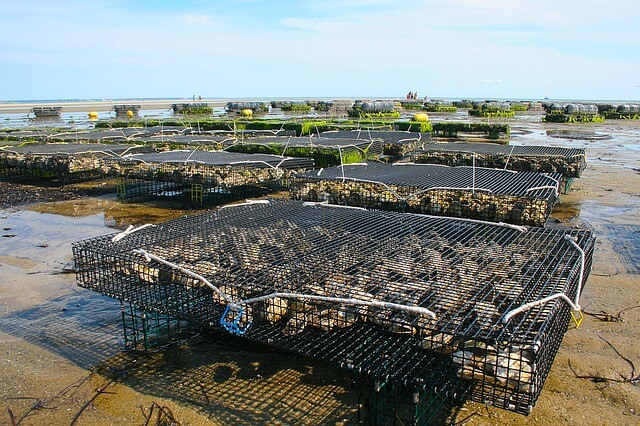AQUACULTURE IN SAUDI ARABIA
Aquaculture refers to the breeding, rearing, and harvesting of fish, shellfish, algae, and other organisms in all types of water environments. It has a similar concept to agriculture but with fish instead of plants or livestock. Aquaculture could be made around the world from coastal seas to tanks on land. Aquaculture is the world’s fastest-growing food-producing sector, over half of the fish products we consume in the world already are supplied by aquaculture.

Oyster farm
Aquaculture began 39 years ago in Saudi Arabia, based on the recommendations made by international bodies. The first step was made in the year 1982, by holding a partnership with FAO -Food and Agriculture Organization-, creating Jeddah Fish Farms Center -Currently Fisheries Research Center-. It purposes to make researches on the suitability of fish types to aquaculture in the country, introducing hatchery and culture techniques, training of national cadres, carrying out studies related to the selection of suitable sites for aquaculture, in addition to providing technical and advisory support to the emerging Aquaculture farms at that time.
Aquaculture was developed until its exports ranked among the top in Saudi Arabia. Now, Saudi Arabia is one of the major white shrimp exporting countries in the world. In 2018 the production capacity rose to 60 KT, 50 KT of them were exported to more than 32 countries. Next Saudi Arabia’s production goal is to reach 600KT of different water organisms by 2030.
Aquaculture is a promising sector that affects development, supports the national economy, and is one of the fastest-growing food sectors, with an average annual growth of 6%. MEWA (Ministry of Environment, Water and Agriculture) relies on Aquaculture to achieve sustainable development, develop coastal rural areas, reduce migration to large cities, and conservation of natural resources by relieving pressure on fisheries.
MEWA also aims to strengthen partnerships with the private sectors, attract in and out investments in aquaculture projects, in addition to providing job opportunities for Saudi people.
Aquaculture projects -especially floating cages projects-, are expected to play a major role in helping border guards to protect Saudi Arabian beaches in the future. Where these Aquaculture projects are located inside the sea, in nonresidential areas, these places are usually the best for fugitives. Due to the security systems Aquaculture systems has, they would be follow-up and control points that can be relayed on.
Share this post
